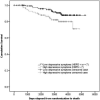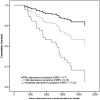Post-surgical depressive symptoms and long-term survival in non-metastatic breast cancer patients at 11-year follow-up
- PMID: 28041571
- PMCID: PMC5215933
- DOI: 10.1016/j.genhosppsych.2016.10.002
Post-surgical depressive symptoms and long-term survival in non-metastatic breast cancer patients at 11-year follow-up
Abstract
Background: Mild to moderate depressive symptoms are common during treatment for non-metastatic breast cancer. The goal of this secondary analysis was to determine if depressive symptoms predict clinical outcomes at long-term follow-up.
Methods: From 1998 to 2005, we interviewed 231 women with the Hamilton Rating Scale for Depression who were participating in a psychosocial study 2-10weeks post-surgery for non-metastatic breast cancer (Stage 0-IIIb). We conducted Kaplan Meier (K-M) curves and Cox proportional hazards (PH) models to examine associations between depressive symptoms, overall survival, and disease-free survival at 8-15-year follow-up.
Results: A total of 95 women (41.1%) scored in the mild-moderately depressed range. Non-depressed women had longer overall survival (M=13.56years; SE=0.26) than those in the mild/moderate depressed group (M=11.45years; SE=0.40), Log-rank χ2(1)=4.41, p=0.036. Cox PH models, adjusting for covariates, showed comparable results: mild/moderate depressive symptoms hazard ratio=2.56, [95% CI, 1.11 to 5.91], p=0.027. Similar results were observed in a subsample with invasive disease (n=191). Depression category did not predict disease-free survival in the overall or invasive sample.
Conclusions: Screening and referrals for treatment of depressive symptoms, even at subclinical levels, is important early in treatment. A randomized trial is warranted to determine effects of depressive symptoms on clinical outcomes.
Keywords: Breast neoplasms; Depressive symptoms; Follow-up study; Recurrence; Survival.
Copyright © 2016 Elsevier Inc. All rights reserved.
Figures


References
-
- Siegel RL, Miller KD, Jemal A. Cancer statistics, 2016. CA: A Cancer Journal for Clinicians 2016. 66:7–30. doi: 10.3322/caac.21332. - PubMed
-
- Antoni MH, Wimberly SR, Lechner SC, et al. Reduction of cancer-specific thought intrusions and anxiety symptoms with a stress management intervention among women undergoing treatment for breast cancer. American Journal of Psychiatry. 2006;163:1791–1797. doi: 10.1176/ajp.2006.163.10.1791. - PMC - PubMed
-
- Chida Y, Hamer M, Wardle J, Steptoe A. Do stress-related psychosocial factors contribute to cancer incidence and survival? Nature Clinical Practice: Oncology. 2008;5:466–475. doi: 10.1038/ncponc1134. - PubMed
MeSH terms
Grants and funding
LinkOut - more resources
Full Text Sources
Other Literature Sources
Medical

